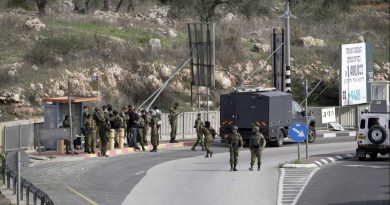Two women charged with UK terrorism offences after pro-Palestinian protest
London (Reuters) – Two women have been charged with terrorism offences after allegedly displaying pro-Hamas imagery at a London demonstration, police said on Friday, as they warned about possible radicalisation as a result of the Israel-Gaza conflict.
There have been growing tensions in Britain and elsewhere since a deadly Hamas attack on Israel last month and Israel’s retaliation on Gaza, with tens of thousands of protesters taking part in pro-Palestinian marches demanding the British government call for a ceasefire.
The women allegedly wore stickers with images of paragliders at a protest in London Oct. 14. They were charged under the Terrorism Act and are due to appear at London’s Westminster Magistrates’ Court Nov. 10.
Some Hamas fighters used paragliders in the attack on Israel and Hamas is proscribed as a terrorist organisation in Britain. The Crown Prosecution Service said the images “aroused reasonable suspicion that they are supporters of a proscribed organization, namely Hamas.
Dominic Murphy, head of the Metropolitan Police’s Counter Terrorism Command, said the public is concerned about “some people using the veil of legitimate protest to carry out criminal or even terrorist activity.”
“There have been an increase in counterterrorism investigations emanating directly from protests,” he told reporters, adding that events overseas “can act as a radicalising factor.”
Earlier this week FBI Director Christopher Wray warned the Hamas attack on Israel that prompted Israel to bombard Gaza would inspire the most significant terror threat to the United States since the rise of ISIS nearly a decade ago.
The Campaign Against Antisemitism on Friday said London police had not applied or enforced existing laws with “sufficient rigour”, and police said they would be proactive and use sharper interventions to make arrests in big crowds, including analysing social media and employing retrospective facial recognition



